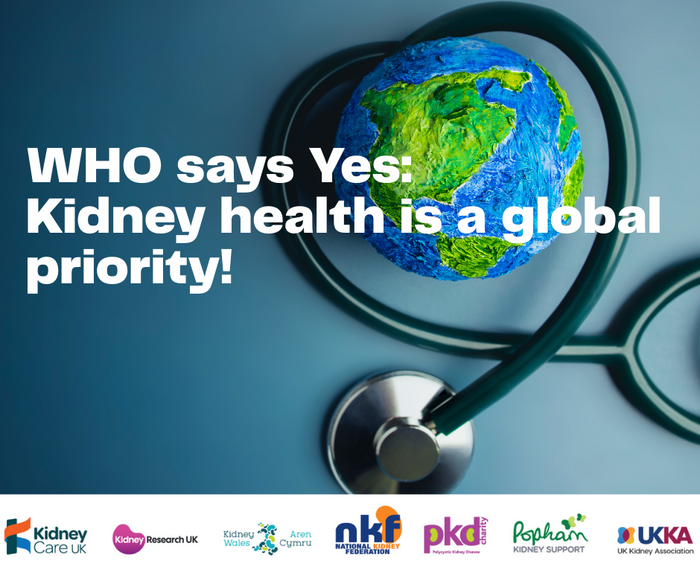Kidney Care UK alongside Kidney Research UK, Kidney Wales, the National Kidney Federation, Popham Kidney Support, the PKD Charity and the UK Kidney Association are delighted to report that on 23 May 2025 the World Health Assembly formally adopted a resolution on reducing the burden of kidney disease.
You can find out more about this resolution here.
This is a milestone for the kidney community, marking international political recognition of the scale and seriousness of chronic kidney disease. It reflects a shared commitment to prioritising kidney disease alongside other major health conditions such as stroke, diabetes and cancer. We’re pleased that the UK government supported this resolution.
In the UK, chronic kidney disease affects an estimated 7.2 million people. It is a lifelong and life-changing condition, placing significant illness and treatment burdens on people and families, and on the health service.
While it can affect any group, it disproportionately affects those who are already socially and economically disadvantaged and those from ethnic minority communities. The costs of providing care for people with kidney failure are high, and continued increase in prevalence could place an unsustainable burden on UK health systems.
However, earlier diagnosis and intervention can help slow the progression of the disease and hopefully result in people not needing dialysis or a transplant.

This global commitment signals a renewed international focus on improving care for the estimated 850 million people worldwide who live with chronic kidney disease and responds to projections showing that without action kidney disease will become the fifth-leading cause of premature death worldwide by 2040.
The WHO resolution on Chronic Kidney Disease highlights four key areas:
- Promote global awareness and education on CKD: Increase public and professional awareness of CKD risk factors and preventive actions through campaigns and policy initiatives.
- Enhance prevention and early detection: Advocate for the integration of CKD case-finding within primary care services, targeting high-risk populations.
- Support access to affordable and quality treatment: Ensure universal access to essential diagnostics and medications and progressively expand access to CKD care and affordable kidney replacement therapy at a rate consistent with local economic constraints, particularly in resource-limited settings.
- Strengthen health systems for CKD management: Build capacity in low- and middle-income countries (LMICs) to deliver person-centred, high-quality care across the continuum of CKD.
This resolution will give impetus to renewed efforts to highlight the importance of kidney health in the UK by:
- Helping to ensure kidney health screening and management is an essential part of routine primary care; ensuring parity with other major long-term conditions.
- Helping to ensure that a series of new and cost effective therapies shown to slow, and sometimes prevent, kidney failure are universally implemented.
- Helping to ensure that new therapeutics for immunological and genetic disease are available and supported in secondary care.
- Helping to signal the importance of optimal dialysis care and innovations in transplantation.
The CKD resolution aligns with the 10 Year Health Plan priorities of moving care from hospital to community and of moving from treatment to prevention. It contributes to the rebalancing of inequities in sickness and access to healthcare in the UK and provides support for international collaboration to ensure that all countries can work towards improving their populations’ kidney health.
Fiona Loud, Policy Director at Kidney Care UK, has been at the World Health Assembly meeting in Geneva this week. She commented:
Seeing kidney disease prevention receive this international recognition — and the UK government adopting and supporting the resolution — is a significant moment for the kidney community.
While the resolution itself is only a starting point for change, with much work to be done, it represents a significant step forward. The WHO has signalled a new recognition of the importance of CKD as a global health priority and of the need to change the future for current kidney patients and those to come.
We look forward to supporting the governments and healthcare systems across the UK to ensure kidney disease is taken seriously and given the profile needed to help improve the lives of people with kidney disease and future generations.